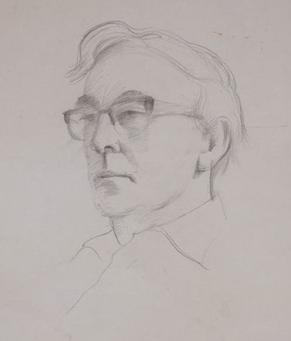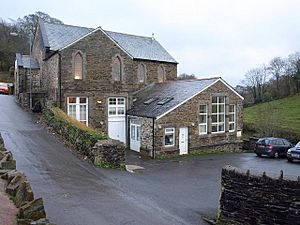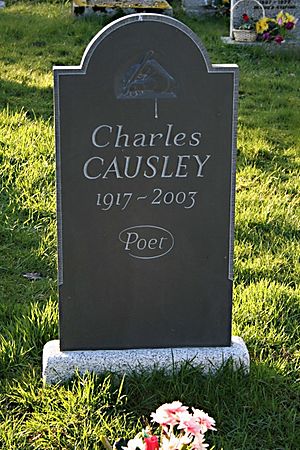Charles Causley facts for kids
Quick facts for kids
Charles Causley
|
|
|---|---|

Pencil drawing of Causley by Stanley Simmonds
|
|
| Born | 24 August 1917 Launceston, Cornwall, England |
| Died | 4 November 2003 (aged 86) Launceston, Cornwall, England |
| Resting place | St Thomas Churchyard, Launceston, Cornwall, England |
| Nationality | British |
| Genre | Poetry (ballads, other formal poetic structures and free verse; also, children's poetry); short plays, including for radio; libretti; short stories; essays and criticism. |
| Notable works | Collected Poems, 1951-1997; Collected Poems for Children; individual poems including 'Timothy Winters', 'Eden Rock' and many more |
Charles Stanley Causley, CBE, FRSL (24 August 1917 – 4 November 2003) was a Cornish poet, schoolmaster and writer. His work is often noted for its simplicity and directness as well as its associations with folklore, legends and magic—especially when linked to his native Cornwall.
Contents
Early years

Causley was born to a couple with deep working-class roots at Launceston in Cornwall, He was educated in the local primary school (a National School) and secondary school (Launceston College), there—and after his military service, at a teacher training college in Peterborough. His father died in 1924 from long-standing injuries from the First World War, when Causley was 7; he was therefore largely brought up by his widowed mother. Largely because of this, Causley had to leave school at 15 to earn money for the home, working as an office boy during his early years. He also played in a semi-professional dance band, and wrote several plays—one of which was broadcast on the BBC West Country service before the Second World War.
Career and achievements
He enlisted in the Royal Navy in 1940 and served as an Ordinary Seaman Coder during the Second World War, firstly aboard the destroyer HMS Eclipse in the Atlantic, at shore bases in Gibraltar and northwest England. Later he served in the Pacific on the aircraft carrier HMS Glory, after promotion to Petty Officer Coder. Causley later wrote about his wartime experiences (and their longer-term impact on him) in his poetry, and also in a book of short stories, Hands to Dance and Skylark.
His first collection of poems, Farewell, Aggie Weston (1951) contained the 'Song of the Dying Gunner A.A.1':
Farewell, Aggie Weston, the Barracks at Guz,
Hang my tiddley suit on the door
I'm sewn up neat in a canvas sheet
And I shan't be home no more.
The collection Survivor's Leave followed in 1953, and from then until his death Causley published frequently, in magazines, in his own volumes and shared ones, in anthologies and then in several editions of his Collected Poems.
After demobilisation in 1946, he took advantage of a government scheme to train as a teacher at Peterborough. He then worked full-time as a teacher at his old school for over 35 years, teaching for his very final year at St. Catherine's CofE Primary elsewhere in the town, where the National School had been relocated. He twice spent time in Perth as a visiting Fellow at the University of Western Australia, and also worked at the Banff School of Fine Arts in Canada.
Causley travelled still more widely and frequently, however, after taking early retirement in 1976 to pursue a full-time career in writing. He was much in demand at poetry readings in the United Kingdom and worldwide—the latter travels were sometimes as part of Arts Council and British Council initiatives. He also made many television and radio appearances over the post-war period, particularly for the BBC in the West Country, and as the presenter for many years of the BBC Radio 4 series Poetry Please.
An intensely private person, he was nevertheless approachable and friendly. He was corresponded with well-acquainted with such writers as Siegfried Sassoon, A. L. Rowse, Susan Hill, Jack Clemo and Ted Hughes (his closest friend) -- and a host of other figures from the literary, publishing and wider cultural spheres around the world, as well the southwest region. In addition to Causley's poetry dealing with issues of faith, folklore, memory, his wartime experience and its later impact, landscape, travel, friends and family, his poems for children were and remain very popular. He used to say that he could have lived comfortably on the fees paid for the reproduction of 'Timothy Winters':
Timothy Winters comes to school
With eyes as wide as a football pool,
Ears like bombs and teeth like splinters:
A blitz of a boy is Timothy Winters.
—first verse
So come one angel, come on ten:
Timothy Winters says "Amen
Amen amen amen amen."
Timothy Winters, Lord.''
Amen.
—last verse
In 1958 Causley was made a Fellow of the Royal Society of Literature, and he was made a CBE in 1986. When he was 83 years old he was made a Companion of Literature by the Royal Society of Literature: he greeted this award with the words, "My goodness, what an encouragement!" Other awards include the Queen's Gold Medal for Poetry in 1967 and a Cholmondeley Award in 1971. In 1973/74 he was Visiting Fellow in Poetry at the University of Exeter, receiving an honorary doctorate from their on 7 July 1977. He was presented with the Heywood Hill Literary Prize in 2000. Between 1962 and 1966 he was a member of the Poetry Panel of the Arts Council of Great Britain. He was twice awarded a travelling scholarship by the Society of Authors. There was a campaign to have him appointed Poet Laureate on the death of John Betjeman, but in the end that role was given to Ted Hughes. Causley himself was not very keen on the idea. However, to the people of his home town, he became "the greatest poet laureate we never had". He was interviewed by Roy Plomley on Desert Island Discs on 1 December 1979: his music choices included five classical selections and three others, while his chosen book was Boswell's Life of Johnson.
In 1982, on his 65th birthday, a book of poems was published in his honour that included contributions from Ted Hughes, Seamus Heaney, Philip Larkin and twenty-three other poets, testifying to the respect and indeed love that the British poetry community had for him. This was followed by a fuller and more wide-ranging tribute (including some unpublished reflective essays, and reproductions of several drafts of his poem 'Immunity' from his archive at Exeter University), published in 1987 and entitled Causley at 70, .
His work, influenced by both traditional folk poems, the classic literary poetry of his childhood reading and school days, and later the Modernist movement's major poets such as W. H. Auden, is nevertheless intensely original and immediately recognisable. Many consider him to be, as Betjeman was, a man working outside of the dominant trends of the poetry of his day.
Causley's popularity amongst general readers and listeners, particularly among the Cornish, remains high, and also appears to be expanding. A particular piece that has gained considerable attention in recent years is the late poem 'Eden Rock', an elegiac reflection on childhood, memory, family and mortality. Its opening lines are:
They are waiting for me somewhere beyond Eden Rock:
My father, twenty-five, in the same suit
Of Genuine Irish Tweed, his terrier Jack
Still two years old and trembling at his feet.
The former Poet Laureate Andrew Motion has said that if he could write a line as perfect as the one which closes this poem, he would go to his grave a happy man. The full text of "Eden Rock" accompanies a recording on the Poetry Archive website of Causley himself reading it (amongst several other poems) aloud, shortly before his death in 2003.
Legacy
The Charles Causley Trust, a registered charity, exists to celebrate his life and work and promote new literature activity in the community and region in which he lived. In 2006, the Trust secured Cyprus Well, the poet's small house in Launceston, for the nation. After considerable repairs, refurbishment and upgrading, that has been opened on a limited basis to the public, and to provide a facility for a varied programme of activities. Most particularly, there has been a series of residencies for writers of all kinds, artists and musicians, as well as other heritage events. These promote both Causley's life and work, and the arts in general—especially across the South West region of Cornwall and Devon.
In June 2010, the first of a continuing series of annual Charles Causley Festivals took place in Launceston, held over a long weekend. Festival programmes encompass literature, music, art and a variety of other fields for adults, families and children, featuring performers and other contributors from the local area, the region, the whole of the UK, and even world-wide.
Subsequently, Festivals have taken place in and around the town for varying periods of up to a full week or more. Over the years, poets such as Sir Andrew Motion (former Poet Laureate, and patron of the Causley Trust), Carol Ann Duffy, Brian Patten and Lemn Sissay, novelists like Patrick Gale, journalists such as George Alagiah, and illustrators like John Lawrence have been headliners. There have also been events with historians, academics and even scientists like Professor James Lovelock (of Gaia Theory fame, and who lives in the district).
Music at the Festival has included regular appearances from Causley's distant relative, folk singer Jim Causley. featuring his settings of Causley poems, some of which have been recorded for commercial CDs. One of these was actually made in (and entitled) 'Cyprus Well', Causley's home of many years in Launceston, and using Causley's own piano there. Many other musicians and groups have featured, too: The Fisherman's Friends, Cahal Dallat, and Seth Lakeman.
The fifth festival in June 2014 was prefaced by the unveiling of a memorial plaque at Cyprus Well (another one later marked his nearby birthplace near St. Thomas Church and the River Kensey). That Festival also marked the centenary of the start of the First World War with a series of talks on war poetry. A documentary film about Causley's life and work, made by Jane Darke and Andrew Tebbs of Boatshed Films, featured in several versions across the 6th and 7th Festivals (2015 and 2016). A shortened version of the full 90' film, The Poet: Charles Causley, was broadcast on BBC4 as Charles Causley: Cornwall's Native Poet on 1 October 2017.
The June 2017 Festival (the 8th) marked the centenary of Causley's birth in August 1917. There were rare performances of several of Causley's one-act plays from the 1930s, and a session from the eminent illustrator John Lawrence and Gaby Morgan marking the re-issue of Causley's Collected Poems for Children. 2018's Festival (the 9th) was headlined by poet and broadcaster Roger McGough, while the 10th Festival in June 2019 showcased events with the Devon folk artist Seth Lakeman, the novelist Patrick Gale, the artist Kurt Jackson, and the poets Alyson Hallett and Penelope Shuttle, amongst many others.
The 2020 Festival which had already been planned to move from its usual late May/early June period in the calendar to late July, was heavily affected by the worldwide coronavirus pandemic. However, instead of being completely abandoned for the year (as happened with other festivals and events of many kinds), the decision was taken to make it an entirely digital Festival, with the usual wide range of events across a long weekend. Most of these (talks, performances and so on) were pre-recorded and entirely free to view through the Zoom videoconferencing platform, while a few were live, paid-for workshops. That innovative approach produced a total 'virtual' audience which was as big, if not in fact a little bigger, as the traditional 'local' formats of the preceding 10 years of Causley Festivals. Some of the audience joined from across the UK, the US, European countries, Singapore, Australia and New Zealand.
In terms of Causley's musical legacy, an original opera by Steven McNeff based on Causley's libretto 'The Burning Boy', was premiered by the Bournemouth Symphony Orchestra's Kokoro Ensemble in Launceston and St. Ives in November 2017. The majority of the songs of Alex Atterson (1931–1996) are settings of Causley poems. A number of other settings have been made of Causley poems over many years, by musicians such as Jim Causley (see above), Natalie Merchant, Johnny Coppin, Mervyn Horder and Phyllis Tate. New versions continue to be composed and performed.
An art exhibition entitled 'Charles Causley: A Tribute from the Artists' was organised to coincide with Causley's 70th birthday in 1987 by Dr. Ron Tamplin of Exeter University, and featured a wide range of paintings, drawings, photographs and sculptures. It later transferred from the University to the Institute of Education in Russell Square, London, for a period; an illustrated catalogue was published.
Charles Causley International Poetry Competitions
The Charles Causley International Poetry Prize is administered by the Causley Trust and is open to anyone over the age of 18. It began in 2013 and has continued in most years since, with a steadily-increasing number of entries. There are a number of monetary prizes and a good deal of publicity for the prize-winning poets and those achieving honourable mentions. After its early years, it developed into an international competition. In 2018, the announcements and presentations were hosted by Paul Tyler, Lord Linkinhorne (a Patron of the Causley Trust), at the House of Lords.
Here is a list of the competition winners and judges to date.
2013
1st prize – Jo Bell, 'The Icicle Garden'. Judge: Sir Andrew Motion
2014
1st prize – Angela Readman, 'The Museum of Water'. Judge: Kathryn Simmonds
2015
1st prize – Claire Dyer, 'Trust and the Horse'. Judges: Professor Antony Caleshu, Dr. Miriam Darlington, Dr. Kim Martindale and Professor Ronald Tamplin
2016
1st prize - Jack Thacker, 'The Load'. Judge: Sir Andrew Motion
2017
(The Competition was suspended for this year.)
2018
1st prize – Judy O'Kane, 'Tasting Notes'. Judge: Sir Andrew Motion
2019
1st prize – Luke Allen, 'First Winter in Iceland'. Judge: Michael Rosen
2020
Winner: to be announced, probably in early 2021. Judge: to be announced in early autumn 2020.
In recent years, the Causley Trust has also administered a Children's (now, Young Person's) Poetry Competition. The judges for that have included Jackie Kay, David Devanny, Patrick Gale and Penelope Shuttle (who are all either Patrons or Trustees of the Causley Trust).
Main Publications
Books primarily intended for adult readers
- Hands to Dance (short stories, later re-published as Hands to Dance and Skylark) (1951)
- Farewell, Aggie Weston (1951)
- Survivor's Leave (1953)
- Union Street (1957)
- Johnny Alleluia (1961)
- Underneath the Water (1968)
- Secret Destinations (1984)
- Twenty-One Poems (1986)
- A Field of Vision (1988)
- Collected Poems: several editions, starting in 1975 and culminating with Collected Poems 1951-2000 (2000)
Books and longer poems primarily intended for young readers (some printed as limited editions, postcards, posters and so on)
- Figure of 8 (narrative poems, 1969)
- Figgie Hobbin: Poems for Children (1970)
- 'Quack!' Said the Billy-Goat (c.1970)
- The Tail of the Trinosaur (1972)
- As I Went Down Zig Zag (1974)
- When Dad Felt Bad (1975)
- The Hill of the Fairy Calf (1976)
- Dick Whittington (1976)
- The Song of the Shapes (1977)
- Twenty-Four Hours (1977)
- The Animals' Carol (1978)
- The Gift of a Lamb (1985)
- Early in the Morning: A Collection of New Poems (1986), with music by Anthony Castro and illustrations by Michael Foreman
- Jack the Treacle Eater (Macmillan, 1987), illustrated by Charles Keeping — winner of the Kurt Maschler Award, or the Emil, for integrated writing and illustration
- The Young Man of Cury and Other Poems (1991)
- All Day Saturday, and Other Poems (1994)
- Collected Poems for Children (1996, reprinted 2017), illustrated by John Lawrence
- The Merrymaid of Zennor (1999)
- I Had a Little Cat (2009) -- an intervening version between those of the Collected Poems for Children, above
Plays and libretti
- Runaway (1936)
- The Conquering Hero (1937)
- Benedict (1938)
- How Pleasant to Know Mrs. Lear: A Victorian Comedy in One Act (1948)
- The Ballad of Aucassin and Nicolette (libretto, 1981)
- The Burning Boy (exact date of composition unknown, but probably in the mid-1980s)
As editor
- Peninsula (1957)
- Dawn and Dusk (1964)
- Modern Folk Ballads (1966)
- Rising Early (1972)
- The Puffin Book of Magic Verse (1974)
- The Puffin Book of Salt-Sea Verse (1978)
- The Batsford Book of Stories in Verse (1979)
- The Sun, Dancing: An Anthology of Christian Verse (1984)
As translator (some in limited editions)
- Twenty-Five Poems by Hamdija Demirovic (1980), translated with the author from the original Yugoslavian
- Schondilie (1982), from the original German by an anonymous author
- Kings' Children (1986), taken from German folk ballads


